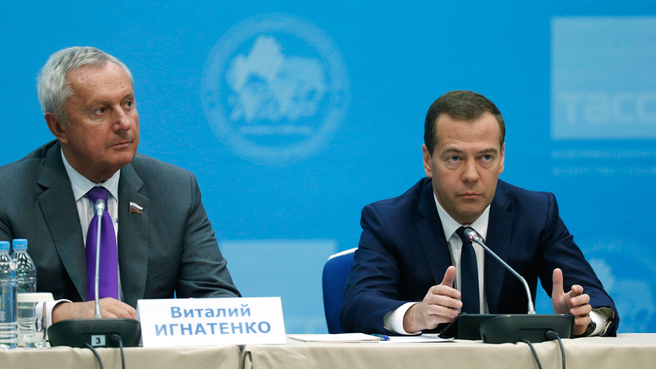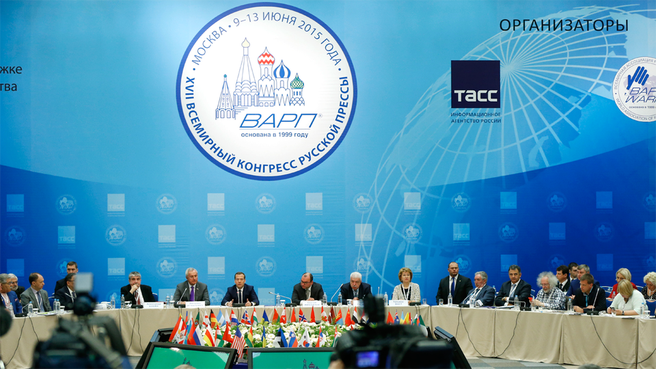Dmitry Medvedev attended the congress and presented Government awards to foreign Russian language media.
From Dmitry Medvedev’s address:
A visit to Moscow is always a chance to see with your own eyes how Russia is doing in current conditions. Things are slightly different from the conditions of say, a year or 18 months ago. However, as you’ve probably seen, nothing much has changed: Moscow is still here, and the Government is still here. In short, we continue working.
Delegates from over 500 Russian-language media outlets and publishers from 63 countries have come to the 17th World Congress of Russian Press. According to different estimates, there are about 3,500 Russian-language publications in 80 countries. Many Russian-language media outlets operate very successfully in many large countries, in all of Germany’s federal states and in every US state.
You are the guides leading millions of people towards a new life in a new country, bridging the language gap and helping them find their bearings amid confusing political and social realities. At the same time, a certain community usually develops around these Russian-language media. This helps people preserve their identity, language and culture, so they don’t feel separated from Russia even though they live away from it.
There may be differences between us in Russia and outside it, but there is also something that keeps us united at a deeper level. This is our common cultural code and the powerful and metaphorical Russian language. This cultural code is the basis for a common system of notional coordinates of all Russian speakers in different countries. This system stands above political disputes and ideological struggles.
In this year of the 70th anniversary of Victory in the Great Patriotic War, we recall the solidarity and patriotism showed by the Russian communities around the world at the most difficult time of the Nazi invasion. Victory in the war is one of the indisputable symbols that unite different generations of Russians abroad and the Russian world as a whole. We must bring this truth to all those who are living in a normal, free world thanks to the heroism of the war-time generation. This is our shared responsibility, especially now that certain forces are trying to create an alternative history of World War II and the Great Patriotic War, to satisfy the demands of the current political environment.
Journalism is a difficult profession. The news media do not require “journalism”; what they want is propaganda. An objective and honest view often comes into conflict with ideological requirements, which is why journalists must remain journalists; they must tell the truth and provide independent opinions.
Our journalists and the staffs of foreign Russian-language publications have problems doing their jobs in many foreign countries. Many countries have black lists of journalists who are prohibited from practicing, whose freedom to travel is restricted and other rights are infringed upon. This is an outrage, but it’s clear that these countries’ governments have their own political goals, such as fighting the so-called Moscow’s agents of influence.
I firmly believe that we must provide for a genuine freedom and independence of the media. It was for this purpose that the World Association of Russian Press was created. Over the past 16 years, you have consolidated the majority of Russian-language publications, radio stations, TV channels and new media outlets outside Russia. Annual congresses of the Russian-language media have become a good platform for exchanging professional experience and starting new projects.
The Russian authorities appreciate the role of the congress and the media it has rallied in consolidating the large Russian-language media community and strengthening the united Russian-language space and the Russian world as a whole. Evidence of this is the 2013 Government decision on media awards. These awards are now given not only to the Russian media, but also to foreign Russian-language media outlets. I held the first awards ceremony this January. We will continue to do this.
We understand how important it is to support Russian-language media and to create conditions for their effective operation. We will continue to support them, despite certain difficulties, using budget and extra-budgetary sources.
One of the indirect methods of supporting Russian-language media is the Russian Language Federal Targeted Programme for 2016-2020, which the Government has approved. Our financial situation is not very comfortable now, yet we have approved and will implement this programme.
This year is the Year of Russian Literature in Russia. It is certainly a global heritage. I urge everyone to take part in its events.
It is notable that not all Russian-language publishers, editors and journalists come from Russia. This is a unique element of the Russian-language diaspora, which is open to people of any nationality, just as Russia is open to them.














